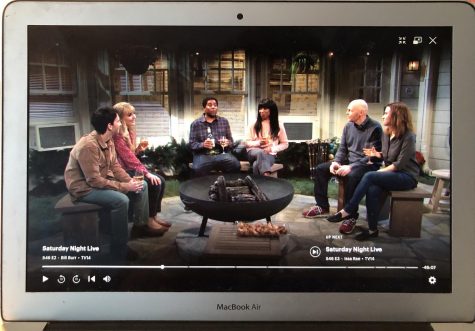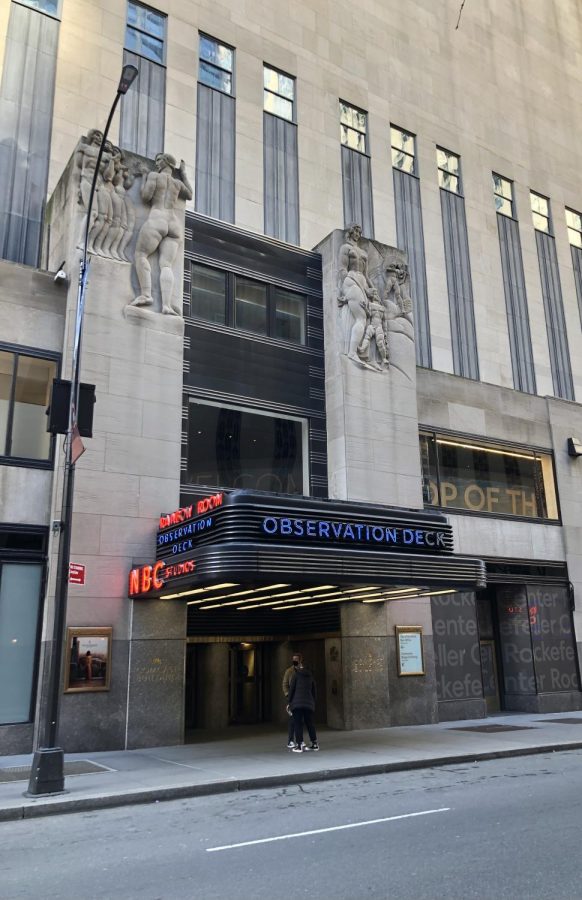Saturday Night Live and the COVID-19 Pandemic
The sketch comedy show is tackling our “noon normal” with candor and true New York City spirit.
S.N.L. has resumed production at 30 Rockefeller Center for Season 46.
“Live, kinda, from all across America, it’s Saturday Night.”
Sitting in his home, and having just torn off a Dr. Anthony Fauci wig, Brad Pitt started off Saturday Night Live’s April 25th, 2020 episode with these words. This modified version of the show’s 45-year-old intro was a recognition of the abnormality of our lives during the COVID-19 pandemic as well as a testament to Saturday Night Live‘s durability, even in the most unusual of times.
After New York City went into lockdown in mid-March 2020, the cast began the production of three at-home episodes. While some sketches took a more serious turn, like the Fauci cold open, many made light of the “quarantine” experience using everything from green screens to ordinary objects found in the comedians’ homes.
In the sketch “Sport Report,” cast member Alex Moffat played an overly-energetic announcer whose only sports-related entertainment consisted of a race between restarting computers and the following of two bananas until one of them formed a brown spot. The sketch titled “Zoom Call” took on the virtual workplace with two technologically incompetent receptionists who alternated between wailing “We ruined the Zoom!” and oversharing personal anecdotes.
The final sketch of the season, “Dreams,” was an ode to pre-pandemic New York City. Using special effects, each member of the cast virtually wandered crowded streets, watched sporting events, or sat at restaurants as melancholy music played in the background. Though infused with subtle and silent jokes, its subject matter demonstrated Saturday Night Live’s unique place in television. No other show could address what it was like living during the Coronavirus pandemic last spring; “Dreams” was something New Yorkers related to as they ached to visit their favorite parts of the city.
For Season 46, Saturday Night Live returned with studio episodes and, interestingly, a live audience. Explaining his decision to do this, creator Lorne Michaels said in an interview for Vulture, “With the kind of comedy we do, which quite often is broad, timing gets thrown off without an audience… That discipline of the audience having a voice is really important to the process.”
Carolyn Chui ’22 agreed, saying, “The lack of [a live studio audience] detracts from the overall essence of the show; hearing the audience laugh during the monologue or Weekend Update adds to its energy.”
However, it is still surprising that Saturday Night Live would take a further risk to keep this element of the show, when they are already forced to take extreme precautions, including the rapid testing of cast members and staff on a daily basis. According to New York State’s Media Production Guidelines, having a studio audience is also illegal. To get around this, Saturday Night Live has paid its audience as employees, a loophole that feels questionable in the midst of a deadly pandemic.
Another choice that has come under criticism was Michaels’s decision to rebook country singer Morgan Wallen for the December 5th, 2020 episode. Wallen had previously been barred from performing on Saturday Night Live after a viral TikTok video showed him partying maskless at the University of Alabama and making out with strangers just days before he was supposed to appear on the show.
When Wallen was invited back, he and host Jason Bateman acted in a sketch parodying the party with Bateman, playing a future Wallen, coming to warn him of the repercussions of the video. Mentioning that he would get kicked off of Saturday Night Live, Bateman said, “Lorne wouldn’t… but the execs at NBC are going to force his hand.” Downplaying the inappropriateness of his behavior and giving the “poor Southern boy” a platform to ask for forgiveness sent a dubious message about the importance of following safety protocol.
Nonetheless, the show has continued to address COVID-19 with relatability and candor. In “Madame Vivelda,” a group of friends visit a psychic who describes visions of them ordering adult coloring books and sanitizing bags of Doritos in the future year 2020. With cast members able to stand on the same stage once again, sketches like “Super Bowl Pod” criticized those who attended group gatherings under the pretense that everybody had been “careful.”
Even more frank was Kate McKinnon’s new Weekend Update character, Dr. Wenowdis. Punctuating Colin Jost’s remarks on COVID-19 and the vaccine with “We know dis” or “We don’t know dis,” McKinnon eventually broke character and addressed the audience directly, one of her notable remarks being “It’s like the light at the end of the tunnel has shown us how stinky and bad the tunnel is.” Although the segment is ridiculous in its premise and fake vaccine spurting, McKinnon’s honesty gave Dr. Wenowdis the comforting air that Saturday Night Live has adopted so well during the pandemic.

Maggie Schneider is an Editor-in-Chief of ‘The Science Survey.’ She loves journalistic writing because it is a recognition of the infinite number of...

